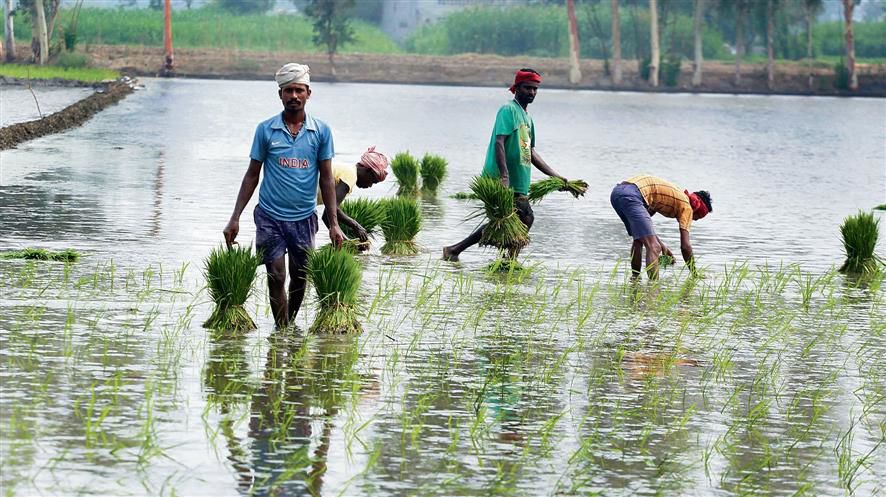To shift from paddy, Punjab farmers demand high-yielding options, assured buyback
Ruchika M Khanna
Chandigarh, July 21
The state government’s ambitious plan to incentivise farmers who shun paddy cultivation has been welcomed by farmers. They, however, feel that it should be accompanied by a rollout of high-yield varieties of alternative crops and sustainable buyback mechanism for those crops.
Yesterday, Punjab Agriculture Minister Gurmeet Singh Khudian had announced that the government would give Rs 17,500 per hectare incentive to the farmers shifting to alternative crops, leaving the water-guzzling paddy. The policy would be effective from the current year.
Incentive amount not enough
The incentive amount is just Rs 7,085 per acre. The average income of a non-basmati paddy sowing farmer is Rs 74,200 per acre… Why will he opt for this scheme when there is no assured buyback of other crops at MSP? Sandeep Jakhar, Abohar MLA
Other crops have low yield
Farmer barely makes both ends meet through paddy cultivation, but what will happen if he produces other crops, having much less yield and no assurance of his crop being bought at MSP? Rajinder Singh Deepsinghwala, Kirti Kisan Union leader
Escaping from bringing new agriculture policy
The government has abandoned claims of a radical new agricultural policy to resolve the state’s agrarian crisis and has limited it to a meagre amount for the cultivation of alternative crops, that too after paddy sowing is complete. Rajinder Singh Joginder Singh Ugrahan and Sukhdev Singh Kokrikalan
The announcement of the new policy has come at a time when around 96 per cent of paddy sowing is already complete. As of date, paddy transplantation on 28 lakh hectares has been completed. “But it’s better late than never. The biggest threat facing Punjab is its imminent desertification in another two decades. Action to reverse the situation has to be taken now. We have started reaching out to farmers in areas where paddy is yet to be transplanted, asking them to go in for other crops,” Punjab Director Agriculture Jaswant Singh told The Tribune.
Jagmohan Singh Patiala of the BKU-Dakaunda, said only the potato and sunflower growers would benefit this year, as paddy sowing was almost complete.
Sandeep Jakhar, MLA from Abohar, said the amount translated into just Rs 7,085 per acre. “The average income of a non-basmati paddy sowing farmer is Rs 74,200 per acre, if the yield is 32 quintal per acre. Why will he opt for this scheme when there is no assured buyback of other crops at MSP?” he said.
Rajinder Singh Deepsinghwala, vice-president of the Kirti Kisan Union, said though he welcomed the first “baby step”, it did not seem a well thought out and planned exercise. “Over the years, there is lack of research on high-yield varieties of legumes; millet seeds are not easily available; and cotton crop is repeatedly falling prey to insect attacks. Farmer barely makes both ends meet through paddy cultivation, but what will happen if he produces other crops, having much less yield and no assurance of his crop being bought at MSP?” he said.
Agreeing with him, paddy grower Shingara Singh of Fatehpur village near Patiala said if the incentive was higher, many farmers would be open to shifting to potato and maize.
Another farmer, Kulwant Singh from Kishangarh in Mansa, said it had taken almost 20 years for Punjab farmers, especially in the south Malwa region, to ready their sandy fields for paddy cultivation. “The government should set a target to wean away farmers from paddy and then work on it by providing them a ready market for alternative crops,” he said.









